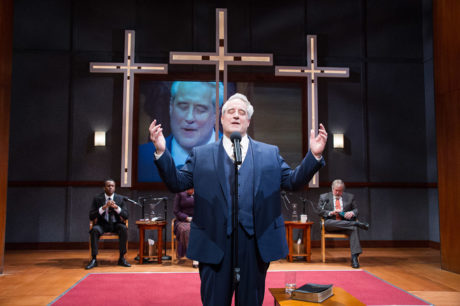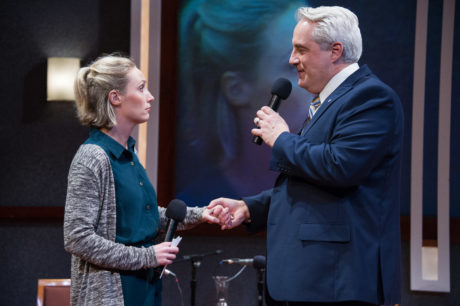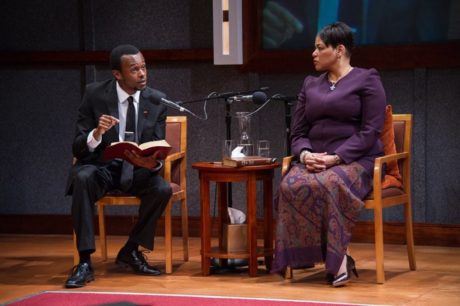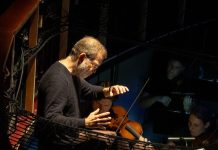Yes, the rumors are true. The Christians—now making its DC debut at Theater J—is amazing.

It’s amazing for its sheer audacity—first, in turning the nation’s leading Jewish theater into a fire-and-brimstone-burning church—and second, for daring to quote the New Testament and Isaiah, along with concepts straight out of the Talmud and Greek tragedy, to an audience more accustomed to laughter and schmaltz.
Of course, there’s a bit of laughter and a spoonful or two of schmalz in this production, but that’s not the point. The Christians, while ostensibly about religious doctrine, is really about hubris–the pride that inevitably leads to a fall—and the power rooted in belief.
The fact that a play with such profound underpinnings can succeed is a tribute to its author, 37-year-old Lucas Hnath, and a cast whose every line is pitch perfect.
On the surface, the story is simple. Pastor Paul, the leader of a hugely successful megachurch—one whose congregants have poured enough cash into its weekly collection to pay off all its debt—has had a vision. He delivers a sermon that he thinks will be greeted with joy.
Instead, the sermon—which rejects a longstanding church belief—is a bombshell. The conflict that emerges is a shock to both the charismatic pastor and his flock.
Michael Russotto is the ebullient pastor who addresses the congregation—and later, his wife, his assistant, a church elder and a parishioner—with paternal sincerity and self-righteousness.
Last seen as an evanescently funny furrier in The Sisters Rosensweig, Russotto has the credibility and stamina to hold the stage, and the audience’s unwavering attention, for the entire play.
Caroline Clay, seen just a few weeks ago in DC in Sense and Sensibility at the Folger, is the pastor’s wife. Clay—whose credits include Broadway, film and TV—is a master of mimicry, able to use a smile or a grimace, a slap of the thigh or the placement of a shawl, to enormous effect. Throughout the play, her mugging signals responses to which the pastor is blind.

Annie Grier is Jenny, a member of the congregation who cannot cope with change. A single mother who can barely make ends meet, Jenny delivers a heart-rending, though totally irrational, plea. It’s a cameo role, yet Grier makes it a showstopper.
Similarly, the pastor’s assistant, Brother Joshua, displays the anger of a young man who feels betrayed by the very faith that saved him. As played by Justin Weaks, he embodies change, yet rejects it.
Michael Willis is the church elder who tries to advise the pastor. Willis is perfect in the role of the chairman of the board—not a minister but a layman—who has given his utmost to making the church a commercial success.
Director Gregg Henry, who has curated the Kennedy Center Page-to-Stage New Play Festival for 11 years, has done a masterful job here, injecting tension into what could easily have been a stilted production. The sermon, addressed entirely to the audience, is mesmerizing.
Thanks to set designer Jonathan Dahm Robertson, the stage is transformed into the altar of a megachurch that reeks of corporate opulence. It is ultra-modern, and would resemble a conference center if not for the three crosses dominating the rear wall; next to them is a giant screen, onto which are projected the words to psalms, the greatly magnified face of the pastor and bucolic images of the sky. One can almost see heaven behind the clouds.
Lined up on the altar are four chairs, microphones, and tables, and water pitchers for the speakers.
Kevin Laughon is responsible for the props, which are minimal, but effective.
Reinforcing the corporate image are the costumes, designed by Danielle Preston with a flair for the ordinary but slightly off-base. All four of the church leaders wear suits. The pastor, as befits a CEO, wears a vest. His wife is dressed in a purple suit that is a little bit snug and a perfectly matching shawl, which she modestly drapes over her legs to hide them when she is sitting. Jenny’s outfit—a marked contrast to the suits—is a simple shirtwaist dress with sweater.
Lighting and sound contribute to the darkening mood, highlighted respectively by Kyle Grant—who creates what feels like a long day falling into night—and Patrick Calhoun, who uses mikes to create the illusion of amplification.
In what is very likely a DC “first,” each performance features a choir from a church in the Greater Washington Metropolitan area.
At the performance I attended, the balconies were filled on both sides by the blue-robed members of the James E. Jordan Jr. Choir, under the baton of Robert Ford, their director. Markus Williams is the music consultant who works with the individual choirs. Theater J literally rocked as the choir sang God is great, followed by two rousing hymns. Even the audience joined in the joyous clapping of hands.
The idea of church as theater and theater as church is not new. Think of the Passion Plays of the 13th century or of the fourth century BCE Greek Theatre at Epidaurus.
In fact, Theater J’s Artistic Director Adam Immerwahr points out the similarities between The Christians and Sophocles’ Antigone, both in structure and in meaning; in both plays, the tragedy lies in the hero’s failure to grasp the result of his actions until it’s too late.
Immerwahr has also called The Christians “Theater J’s most Jewish play of the season.” The reason, he says, is that it’s a play about the tolerance—or lack of it—for debate.
Debate is intrinsic to Judaism, and is the basis for the Talmud—the two thousand year old compendium of rabbinical arguments—which assumes that anything that isn’t proven is just as important as anything that is.

Debate is Pastor Paul’s credo. But it is inconceivable—and frightening—to his flock.
In one of the play’s most powerful invocations of Jewish thinking, Joshua, the feisty assistant pastor, begs the pastor to banish his doubts by simply repeating over and over ‘I believe.’
Ironically, he is echoing the words of Maimonides, the 12th century Jewish poet and scholar, who wrote the prayer ‘Ani Maamim,’ which means literally ‘I believe.’
The pastor can’t accept that.
Nor can the author of The Christians, which had its New York award-winning premiere a year ago at Playwrights Horizons.
Here in DC, performances promise to sell out quickly. This is a ‘don’t miss’ opportunity to witness a rare moment in contemporary theater.
Running Time: 90 minutes, with no intermission.
The Christians plays through December 11, 2016, at Theater J at The Edlavitch DCJCC’s Aaron & Cecile Goldman Theater – 1529 16th Street, NW (16th and Q Streets), in Washington, DC. For tickets, call the box office at (202) 777-3210, or purchase them online.
LINKS:
In the Moment: ‘The Christians’ at Theater J by David Siegel.
Magic Time! “It’s Our Most Jewish Play This Season”: A Q&A With Adam Immerwahr About ‘The Christians’ at Theater J by John Stoltenberg.




